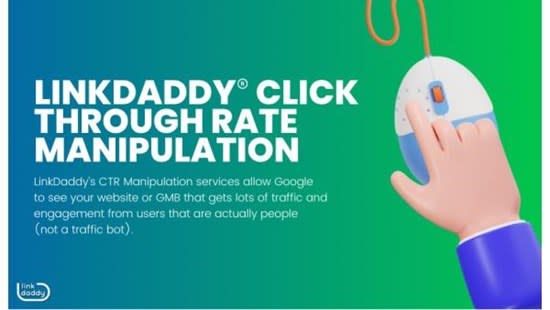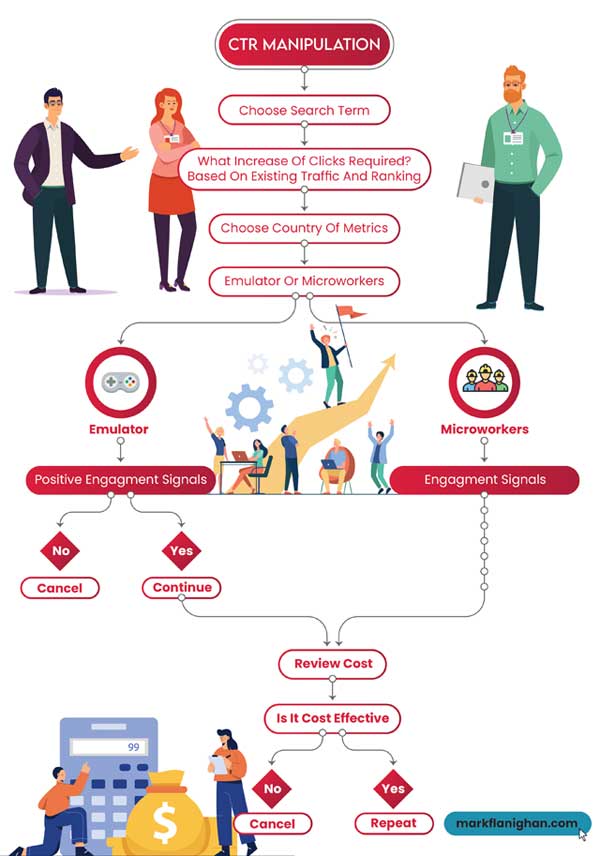Checking Out the Relationship In Between CTR Adjustment Services and User Actions
In the realm of electronic marketing, the influence of click-through price (CTR) adjustment solutions on customer behavior stays a complicated and appealing topic. As on-line platforms increasingly depend on CTR metrics to determine the success of material, products, and solutions, understanding just how these manipulated prices effect individual involvement and decision-making procedures is extremely important. The interplay in between CTR control and user behavior questions concerning authenticity, trustworthiness, and the ethical effects of such techniques. By studying the detailed partnership in between CTR manipulation services and customer behavior, fascinating insights emerge that may reshape our understanding of electronic advertising strategies and their impacts on consumers.
Influence of CTR Control on Actions
Analyzing the influence of Click-Through Rate (CTR) manipulation on individual actions discloses critical understandings right into the dynamics of online engagement. CTR control entails unnaturally inflating the number of clicks on a particular web link or advertisement to deceive customers and search engines. This method can result in a distorted assumption of a web page's popularity or significance, eventually impacting individual behavior.

Furthermore, CTR control can skew the data used by formulas to customize user experiences. This can result in individuals being served content that does not line up with their choices or rate of interests, ultimately causing a decrease in customer complete satisfaction and involvement. Understanding the effect of CTR control on user actions is vital for keeping transparency and rely on online interactions.
Individual Engagement With Manipulated CTR
Individual interaction with adjusted CTR data typically leads to manipulated perceptions of on the internet web content appeal and relevance. When customers interact with material based upon artificially filled with air Click-Through Fees (CTR), they may believe that particular details, items, or solutions are much more prominent or reliable than they actually are. This can cause users making choices based on deceptive information, causing possibly unfavorable results.
Interaction metrics like sort, shares, remarks, and time invested on a website are often affected by CTR control. Users may be more likely to involve with web content that shows up to have greater involvement prices, further perpetuating the cycle of skewed perceptions. Therefore, web content designers and marketers might prioritize creating material that creates high CTR instead of concentrating on producing truly important and appropriate product.

Mental Impacts of CTR Adjustment

Additionally, the emotional results of CTR manipulation can ctr manipulation also show up in altered decision-making processes. Users might be a lot more likely to click content entirely based upon its regarded popularity, instead than its actual value or significance to their requirements. This behavioral change can lead to a superficial interaction with online web content, where individuals might overlook top quality however much less preferred offerings for those with artificially enhanced CTRs.
Essentially, the mental implications of CTR manipulation highlight the value of maintaining openness and authenticity in on the internet interactions to foster authentic individual interaction and trust.
Moral Factors To Consider in CTR Control
CTR manipulation elevates issues concerning deceiving individuals, misshaping data analytics, and compromising the integrity of on the internet content. By artificially blowing up CTR, users may be misled into clicking on web links or ads they would not have chosen otherwise, leading to an insincere online experience.
One more moral element to ponder is the fairness of adjusting CTR to acquire an unreasonable advantage over competitors. Participating in such methods not just violates principles of fair game however also threatens the count on that individuals position in on the internet platforms. It is essential for businesses and electronic marketing professionals to support honest requirements in their techniques to guarantee transparency, reputation, and lasting sustainability in the on-line atmosphere.
Implications for Digital Marketing
With the boosting reliance on digital systems for marketing functions, the technique of controling click-through prices (CTR) positions considerable ramifications for the performance and integrity of electronic advertising methods. CTR control can result in skewed data analytics, misinforming marketing professionals right into thinking that their projects are performing much better than they in fact are. This can cause misallocation of sources, with firms buying underperforming techniques based upon falsified CTRs. When individuals recognize that CTRs have been controlled, it can deteriorate trust in the brand name, leading to long-term adverse repercussions for customer loyalty and brand reputation.
In addition, making use of CTR adjustment solutions can create an unfair competitive landscape, where business that take part in such practices obtain a synthetic advantage over those that abide by ethical marketing standards. This can stifle innovation and imagination in electronic marketing, as success becomes more about adjustment strategies than delivering real value to consumers. Eventually, the implications of CTR adjustment for electronic marketing extend past temporary gains, affecting the overall sustainability and trustworthiness of advertising initiatives in the electronic realm.
Final Thought
To conclude, the relationship in between CTR adjustment services and user actions is complicated and complex. The influence of CTR manipulation on actions, individual involvement with controlled CTR, emotional impacts, ethical factors to consider, and implications for electronic marketing all play a function in forming this relationship. Comprehending these characteristics is critical for marketers and scientists alike in order to browse the moral implications and make best use of the performance of their digital marketing approaches.